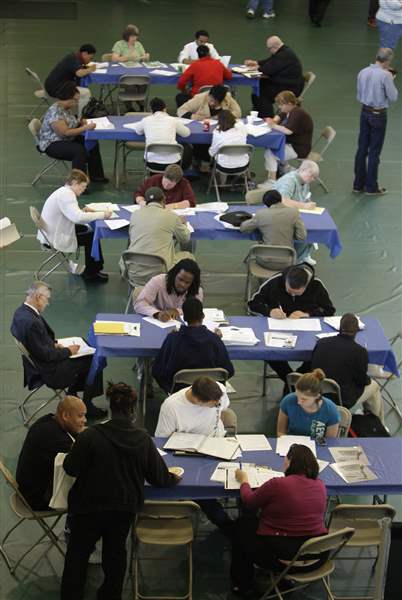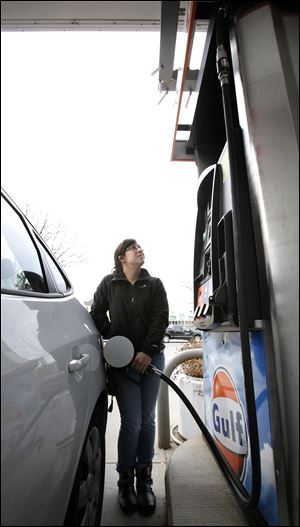
U.S. economic growth is weak in 1st quarter
Gas prices, few pay hikes hurt spending
5/27/2011
Applicants at a job fair in Painesville, Ohio, this week are numerous as hiring remains sluggish across much of the United States.
ASSOCIATED PRESS

Consumers paying more for gasoline, because of upheaval in the Middle East and North Africa, have less money to spend on other items.
WASHINGTON -- High gasoline prices, government budget cuts, and weaker-than-expected consumer spending caused the economy to grow only weakly in the first three months of the year.
The U.S. Commerce Department estimated Thursday that the economy grew at an annual rate of 1.8 percent in the January-March quarter. That was the same as its first estimate a month ago.
Consumer spending grew at just half the rate of the previous quarter. And a surge in imports widened the U.S. trade deficit.
Most economists think the economy is growing only slightly better in the April-June quarter. Consumers remain squeezed by gas prices, scant pay increases, and a depressed housing market.
Analysts estimate that growth has accelerated slightly to around 2.5 percent in the April-June quarter. For the entire year, they think the economy will grow around 3 percent. That would be little changed from the 2.9 percent growth in 2010.
Growth is expected to improve modestly in the second half of 2011 as stepped-up hiring helps stimulate consumer and business spending. Companies are also benefiting this year from a tax break that lets profitable businesses write off large capital expenditures right away rather than gradually.
Still, a Labor Department report Thursday suggested that the job market is sluggish. The government said more people applied for unemployment benefits last week, the first increase in three weeks.
The number of people seeking jobless benefits rose by 10,000 to a seasonally adjusted 424,000.
Applications are above the 375,000 level that's consistent with sustainable job growth. Applications peaked at 659,000 in the recession.

Applicants at a job fair in Painesville, Ohio, this week are numerous as hiring remains sluggish across much of the United States.
Employers stepped up hiring this spring, but some economists worry that rising applications mean it is slowing.
Economists caution that the outlook could dim if oil prices head higher or financial markets are jolted by Europe's debt crisis or a failure by Congress to raise the government's borrowing authority this summer.
"I think consumers will hang on and start to do their part to lift the economy," said Mark Zandi, chief economist at Moody's Analytics. "The job market is improving, and more job growth means more income growth and that will help spending."
Global stock markets have been weighed down by concerns about the pace of the U.S. recovery and worries over Europe's debt crisis, particularly whether Greece will have to restructure its debts.